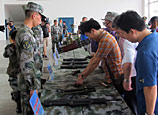
Experts have called for a promotion of "citizenization" in an apparent effort to push forward urbanization in the country, according to the latest report on China's urban development by the Chinese Academy of Social Sciences (CASS).
The process of citizenization, as described by Shan Jingjing, an editor of the report, is where urban authorities grant migrant workers the same rights and benefits as its registered citizens, he added that this is a key part of urbanization.
The current citizenization rate in China lags far behind the urbanization rate. In 2011, urbanization was 51.3 percent but citizenization was less than 40 percent, the report said. This means that a huge number of urban residents do not enjoy the benefits they deserve.
There is no clear agreement on the actual rate of China's urbanization. In 2012, the urbanization rate calculated by the CASS was 42.2 percent, 10 percentage points lower than the calculation by the National Bureau of Statistics.
The report forecasts that citizenization could be completed by 2030, when 390 million migrant workers would enjoy the status and benefits of urban residents.
Shan told the Global Times that the current system of residence permit registration, or hukou, should be reformed so as to gradually push forward citizenization.
This has met opposition from urban residents for fear that their rights would be affected by the army of migrant workers flooding into cities.
"Conflicts will become unavoidable when we have to share limited resources in urban areas," a Beijing resident surnamed Gao told the Global Times Wednesday.
Niu Fengrui, former director of the Institute for Urban and Environmental Studies under the CASS, said that conflicts also emerge from the current disparity between urban residents and disadvantaged groups.
Shan also said the government is obliged to guarantee the same rights for everyone, as current annual spending on citizenization is bearable, at 8 percent of the national fiscal income.
"Every city has its population cap, but major cities have not yet met the limit," Shan noted, adding that with technological advancement there is the potential for cities to house more people.
Shan admitted that many obstacles remain, highlighting the huge financial cost of realizing full citizenization and the need for better education of migrant workers to help them assimilate into being urban residents.
Niu said it would take a long time to complete citizenization, adding that the government should prioritize economic growth, rather than increase spending.
"We should not be hasty in pushing this. All the problems need to be handled gradually," Shan said.
















 Man commits suicide, rescued by his wife in NE China
Man commits suicide, rescued by his wife in NE China


![]()
